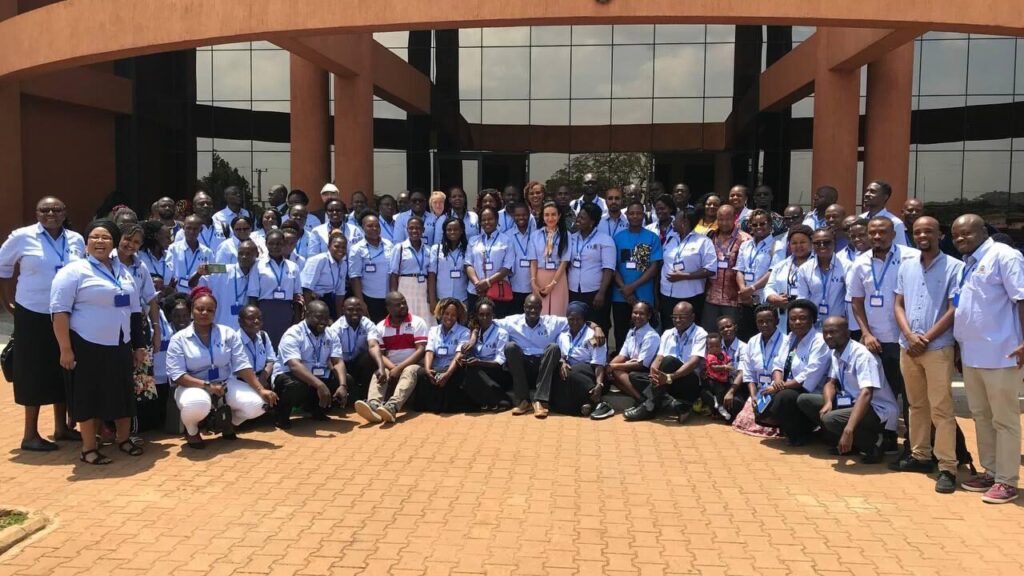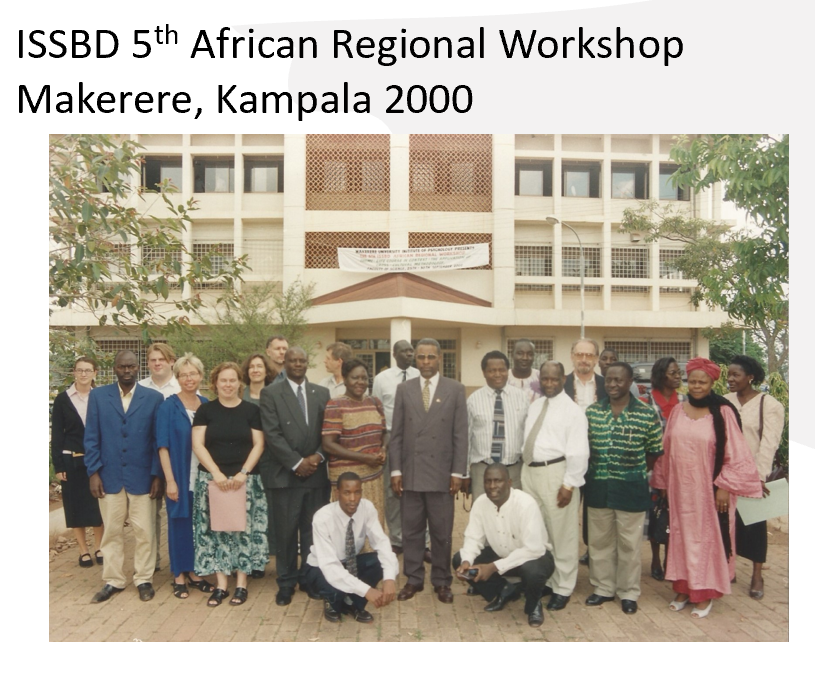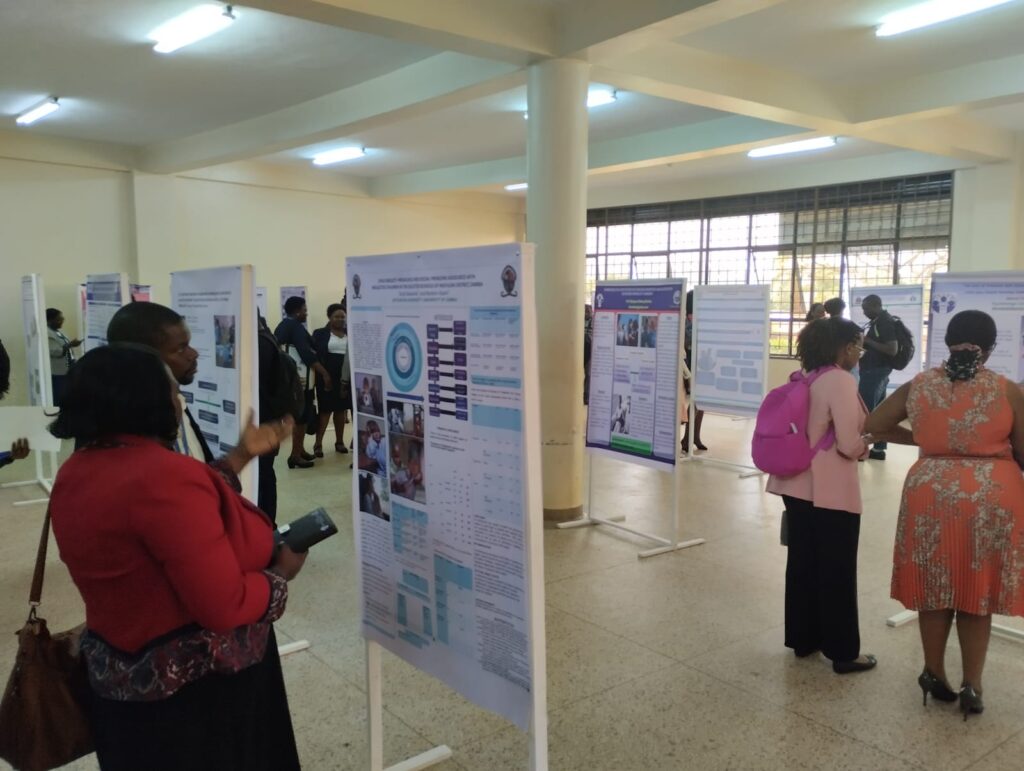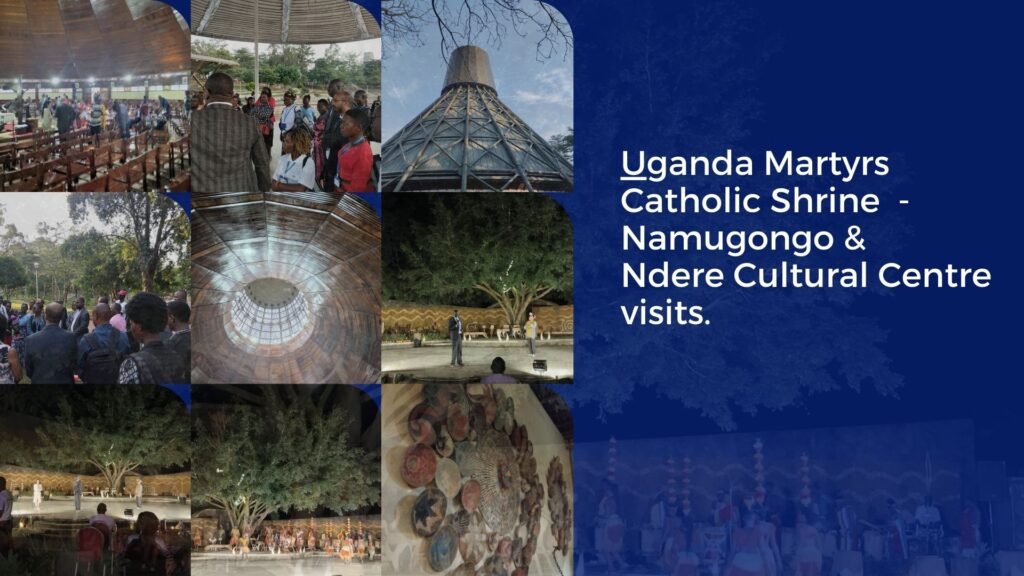Highlights from the 15th African Regional Workshop.

The recently concluded 15th ISSBD African Regional Workshop, held at Kyambogo University in Kampala, Uganda, from August 10th to 12th, 2023, was a gathering of African scholars, researchers, and practitioners. This workshop was under the theme, “Positive Parenting for Contextually Relevant Childhoods in Emerging Contexts: The Role of Intervention Research.” It had presentations on diverse topics. The sessions were engaging and interactive and thus were a great platform for knowledge exchange and collaboration for all participants. Among the participants were Jacobs/ISSBD PhD Fellows and ISSBD African Professional Development Fellows. The workshop had 120 participants drawn from 23 African universities and 10 early childhood intervention research implementers. Participants from outside Africa came from the USA, Canada, and Germany.
Preliminaries
During the opening remarks, Prof. Godfrey Ejuu, the Workshop Convener, emphasized its significance as a platform for African scholars to contribute to the global discourse on human development. Prof. Joyce Ayikoru Asiimwe, the Chair of the 15th ISSBD Africa Region 2023 Organizing Committee and Dean of the School of Education at Kyambogo University stressed the workshop theme’s relevance in addressing evolving challenges children face in an interconnected world. She underlined the need for contextually relevant parenting approaches and resilient family bonding practices. Representing Kyambogo University’s Vice Chancellor, Prof. Maria Musoke praised the workshop’s focus on nurturing early-career African scholars and noted that the poster presentations were quite innovative. Prof. Tina Malti, ISSBD President, emphasized the need to equip researchers with the necessary skills to support parents in successfully caring for children. In her opening remarks, former president and current ISSBD fellows’ faculty, Prof. Anne Petersen, noted that past ISSBD African regional workshops had positively impacted the research and practice of African scholars.
Workshop sessions
The workshop sessions began with a keynote address by Prof. Therese Tchombe. She discussed how parents could creatively use technology to support their child-raising duties in the ever-changing digital era. The presentation called for a balanced integration of traditional parenting values and digital resources to address the challenges posed by the digital age, which threaten to move parents to the periphery of their children’s development.
Next, there was a panel presentation on Participatory Action Research led by Kisii University’s Dr. Pamela Wadende and her colleagues Dr. Henriette Zeidler and Patrick Njoroge. They showcased the potential for communities to engage in research processes that actively drive meaningful change. They explained that their research project recruited and actively involved teachers, parents, and community volunteers in all its steps.
Dr. Chukwuorji, a Fulbright scholar at Cleveland State University, Ohio, USA, introduced attendees to scoping reviews as an evidence synthesis approach, offering insights into navigating existing literature in ways that bring together information from a range of sources and disciplines to inform debates and decisions on specific issues. He explained how to conduct scoping reviews and how they can inform interventions, among others.
Prof Tina Malti’s keynote address was based on a community-based intervention to improve human relationships. She noted the importance of recognizing and working with every child’s unique capacities and strengths, which is essential in promoting positive growth. Children vary in abilities, and paying close attention to their attributes is crucial. Nurturing these strengths in each child is critical to building caring communities that support children to reach their full potential.
Caroline Nyuguto, a partner who works for Innovations for Poverty Action, shared insights on effective researcher-practitioner engagement in low and middle-income countries. She based her presentation on her organization’s work to eradicate poverty in Africa.
Prof. Toni Antonucci’s keynote address focused on mixed methods study designs and data analysis. She emphasized the significance of adhering to the fundamental principles of mixed-methods research and the value each approach brings in alignment with research goals. She advised that researchers embracing mixed methods should acquire essential skills and comprehensive knowledge of the specific techniques used in this approach. Prof. Antonucci also discussed the relationships between technology and human culture in an increasingly digital world. Some highlights of her address included acknowledging that technology offers enormous potential for human connection, though it depends on how the technology is used. There is a need to be mindful and carefully plan to protect and enhance the experience of children and their families as they use technology for communication.
Prof. Robert Serpell, from the University of Zambia, gave a reflection on the long journey of ISSBD in Africa. His address focused on affirmative theory as a bridge between local and international concerns in early childhood education. His presentation focused on the dangers of over-emphasis on superficial indicators in public dissemination of research findings and their interpretation at local, national, and regional levels. He discussed some theoretical growth points that are Africentric and suitable as foundations for innovative services designed to support local families to optimize opportunities for children to thrive and progress towards locally and nationally agreed developmental goals.

Prof. Ann Petersen, one of ISSBD’s former president and current mentor, keynote address focused on the critical role of qualitative data analysis in contemporary research.
During the workshop, Dr. Jackline Folotiya, from the University of Zambia, reflected on her journey with ISSBD and what she has been able to benefit from in her poster presentations. She emphasized the importance of using supporting charts, figures, images, or tables to present study results in posters. Her insights on presenting data in a viewer-friendly manner and providing clear pictures were crucial for all Early Career Researchers (ECRs) aiming to engage successfully in scientific dialogue. At this workshop, all ECRs were given an opportunity to share their work in the form of poster presentations.

Prof. Peter Baguma of Makerere University, Uganda, a pioneer member of ISSBD in Africa, delivered the last keynote speech. He began with a reflection on ISSBD’s growth in Africa. His presentation was about creating culturally suitable, accurate, consistent measure scales within the swiftly evolving African research landscape. He outlined the definition of a test, expounded upon the strategies and phases involved in test development, elucidated the test adaptation processes, and stressed the significance of adhering to the International Test Commission Guidelines.
In addition to the keynotes, presentations by ISSD Professional Development fellows played a significant role in enriching the workshop’s content. Dr. Lilian Fai addressed the issue of school violence and shared her efforts to reduce violence in schools. Dr. Valentine Ngalim highlighted soccer’s role as a foundation for peace-building, showcasing its impact on communities. Dr. Rose Atieno and Dr. Samson Mhiza from Zimbabwe presented the IHELP project, which focuses on increasing access to early learning in Kenya, Uganda, and Zimbabwe. Prof. Godfrey Ejuu gave a presentation on the child-to-child project implemented in Uganda, Malawi, and Ethiopia. They all attributed their success to ISSBD mentorship, which equipped them with the skills to initiate, write, and conduct these projects.
A unique part of this workshop was the group of exhibitors from NGOs supporting Early Childhood Development and Research, such as Innovations for Poverty Action (IPA), which is working to improve the lives of poor people through rigorous research and evidence-based policies and related intervention programs. Acres of Fun Pre-school and Literacy and Adult Basic Education (LABE) also attended the workshop. The former works on inclusivity for children on the autism spectrum alongside their neurotypical peers, while the latter brings together generations within families to empower them through primary education, promoting equity and fostering community support networks.

In addition to knowledge sharing during the workshop, participants had the privilege of immersing themselves in Uganda’s rich culture through local tours. The Ndere Cultural Tour presented a celebration of the vibrant diversity of African cultures through music, food, drinks, dance, and traditional attire. The workshop participants visited the Ugandan Martyrs shrine and listened to a presentation about sacrifices made by those martyrs who stood firm in their faith despite persecution.
In her closing remarks, the ISSBD president, Prof. Malti, reflected on how important it was for researchers, policymakers, and practitioners to collaborate to improve local communities. She explained that researchers should aim to communicate findings clearly to stakeholders in ways that help them pick essential points to inform their practice. She also shared the new initiatives, such as the ISSBD 2 x 2 Grant for Early Career Scholars, which was soon being announced. Prof Malti announced the newly created ISSBD committees, Optimizing Capacity and Global Policy Committee, aimed at connecting research and practice at regional and global levels.
ISSBD extends its heartfelt gratitude to the dedicated local and International workshop organizing committees and session moderators for their incredible efforts in creating a workshop that enriched our minds, hearts, and spirits.
See you all in Lisbon, Portugal, for next year’s Biennial conference!